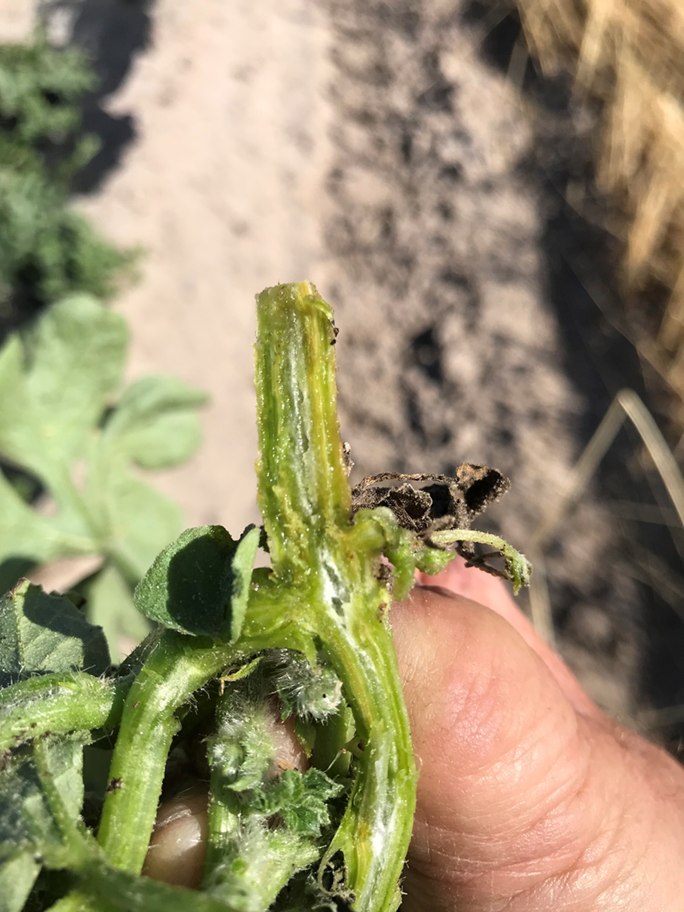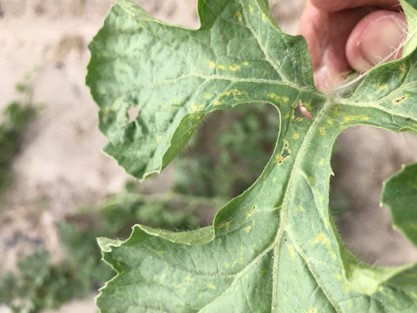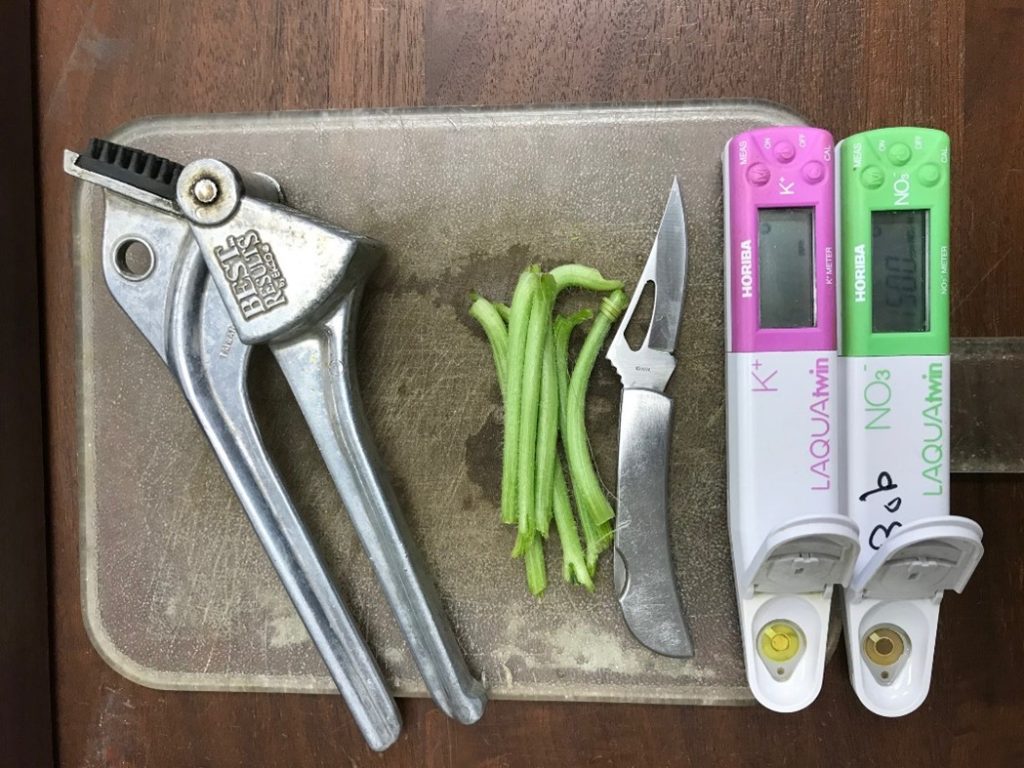Welcome to our 2024 season’s weekly issue of the UF/IFAS Extension Suwannee Valley Watermelon Crop Update. These updates will be summarized by Bob Hochmuth, Regional Specialized Extension Agent- Vegetable Crops, with input from Suwannee Valley Extension Agents: Mark Warren (Levy), Tyler Pittman (Gilchrist), Tatiana Sanchez (Alachua), Luke Harlow (Bradford), Dan Fenneman (Madison), Keith Wynn (Hamilton), Emily Beach (Lafayette), Jim Devalerio (Union), De’Anthony Price (Jefferson), Raymond Balaguer(Suwannee), Kevin Athearn (RSA-Agri- business), Shivendra Kumar (RSA-Agronomic Crops), Jay Capasso (RSA- Water Resources), and Bob Hochmuth covering vacant Columbia County position.
– –
Early season disease management
 The early planted crops have vines well off of the plastic and are beginning to bloom. Without a specific disease problem being detected on a farm, we continue to recommend using a weekly Bravo or other chlorothalonil product schedule for this early part of the season, perhaps the first few sprays, prior to fruit sizing stage. Banding sprays over the beds only while plants are small is very economical. However, our UF/IFAS lab has confirmed a couple of gummy stem blight infections in early planted transplants. Most cases are pretty limited and may not require initiating something like Inspire Super, but growers should assess whether the infections warrant something other than chlorothalonil. You certainly do not want to unnecessarily use those expensive targeted products.
The early planted crops have vines well off of the plastic and are beginning to bloom. Without a specific disease problem being detected on a farm, we continue to recommend using a weekly Bravo or other chlorothalonil product schedule for this early part of the season, perhaps the first few sprays, prior to fruit sizing stage. Banding sprays over the beds only while plants are small is very economical. However, our UF/IFAS lab has confirmed a couple of gummy stem blight infections in early planted transplants. Most cases are pretty limited and may not require initiating something like Inspire Super, but growers should assess whether the infections warrant something other than chlorothalonil. You certainly do not want to unnecessarily use those expensive targeted products.
This past week began the first real sightings of Fusarium wilt symptoms. In many cases a few plants here and there, but in other cases a high percentage of plants in parts of fields have shown wilting. You may notice a runner or two starting to wilt but as the season progresses, the entire plant may succumb to the disease. Mild soil temperatures are favorable for the fungus to grow so in general, conditions will remain good for pathogen growth this week (disease incidence is maximum at around 80.6-84.2F). When soil temperatures increase, conditions are no longer favorable for the pathogen, but the infection has already occurred. As the demand for water increases as vines grow and fruit begin to set, you will notice more plants exhibiting symptoms resulting from the clogging of the vascular system responsible for transporting water. If you notice plants with low vigor, wilting during the hottest parts of the day and with a grayish-green appearance you can test in the field for Fusarium. Sample plants, including the plant’s crown area that are exhibiting these wilting symptoms (the crown area is around the soil line that separates roots from above-ground growth). Once you pull the plant, cut downward through the middle of the crown, and inspect the color of the vascular system. If the plant is infected, you will notice a brown or orangish discoloration along the vascular vessels at the crown, and if healthy, it will look whitish or light green. As you may know, there are no controls available for this disease after the crop is established. There are treatments (ex. Proline and Miravis Prime) at planting that research has shown to have some minor benefit in reducing infection, but those treatments are not effective at this stage of the season after infection is in full swing. If you suspect you have Fusarium and want confirmation, reach out to your local agent to submit a sample. Check page 33 of the UF/IFAS Watermelon Field Guide for more information. Otherwise, we are still suggesting weekly chlorothalonil sprays unless very early planted field may be getting close to a Miravis Prime application for those choosing that program. Note, no bacterial spot, powdery mildew, or downy mildew have been detected or reported yet. (Tatiana Sanchez-Jones and Bob Hochmuth)
–
Weekly Insect Update
 Squash bugs (See pages 100-101 in your IFAS Watermelon Field Guide): During the last week, squash bugs were reported for the first time this season in the region. Most were still individual adults as opposed to mating pairs which tells us that the bugs are just now migrating from wooded areas outside the field perimeters into the fields. We encourage everyone to scout and detect them early. It is better to spray the borders earlier as they migrate in as opposed to having to spray the entire field potentially killing many beneficials as the pyrethroids recommended for use on squash bugs are hard on pollinators. (R. Hochmuth)
Squash bugs (See pages 100-101 in your IFAS Watermelon Field Guide): During the last week, squash bugs were reported for the first time this season in the region. Most were still individual adults as opposed to mating pairs which tells us that the bugs are just now migrating from wooded areas outside the field perimeters into the fields. We encourage everyone to scout and detect them early. It is better to spray the borders earlier as they migrate in as opposed to having to spray the entire field potentially killing many beneficials as the pyrethroids recommended for use on squash bugs are hard on pollinators. (R. Hochmuth)
Thrips were out in full force across the region last week. These tiny yellowish/orange bullet shaped insects scratch on the surface of watermelon leaves and cause scarring (see photo below). Thrips can also feed in the blooms of watermelon. However, these insects rarely cause enough damage in watermelons to spray. These insects will also scratch on your skin and cause a mild itch as if you were being bitten by “no see-ums”. We mainly want everyone to be able to identify the damage of thrips feeding in the photo below. (R. Hochmuth)
–
Petiole-sap testing service offered
UF/IFAS County Extension agents will again be offering the weekly petiole-sap testing service for growers in their counties. All Extension agents in the Suwannee Valley have the equipment and expertise to conduct this service. We offer testing for nitrogen and potassium, which helps growers fine tune the fertigation events for frequency and amounts to be fertigated. We are ready to conduct petiole-sap testing when the vines are at least 12-15 inches long. Contact your County Extension Agent to start this service. (Bob Hochmuth)
Save the Date
Save the date of April 18th for the Suwannee Valley Spring Twilight Watermelon Field Day, at the farm of Adam Whitehurst where experts will discuss topics of controlled release fertilizer use, irrigation automation, soil moisture sensors, grafted watermelons, and paper mulch all in one field. CEUs will be provided. Look for more details in next week’s update. (Extension Agent team)
We have initiated a more formal way to support our watermelon growers with a rapid diagnostics system through Suwannee Valley Regional and County Extension Agents. This industry-funded program allows Extension Agents to submit and pay for watermelon grower’s plant disease and other diagnostic samples. This SV Rapid Diagnostic Watermelon Program will help us to get quicker diagnostic results, helping to give early alerts to everyone, and not have to charge the growers directly. Plant disease samples are typically $40 and leaf tissue analyses are typically $20.
If you know someone who wants to be added to this weekly notice, contact Mark Warren (352-949-8288) to be added to the regional watermelon group text app.
We are currently extending our solicitation of those industry reps interested in sponsoring this effort. The past year’s sponsorships have ranged from $200 to $2,000 per company. Sponsors will be recognized every week beginning this week. Those interested in being added as a sponsor can contact Bob Hochmuth at bobhoch@ufl.edu or 386-288-6301.Current 2024 sponsors of our Watermelon Rapid Diagnostics Program include Valdosta Plant Company, Mayo Ag Services, Gowan USA, and Harrell’s Fertilizer. Others are still welcome to join.
- 2024 Watermelon Season Wrap Up - June 21, 2024
- Weekly Watermelon Update – June 3 - June 7, 2024
- Weekly Watermelon Update #10 – May 20 - May 24, 2024

